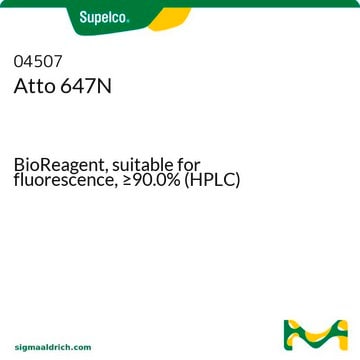91000
Atto 647N azide
BioReagent, suitable for fluorescence
Se connecterpour consulter vos tarifs contractuels et ceux de votre entreprise/organisme
About This Item
Code UNSPSC :
12352125
Nomenclature NACRES :
NA.32
Produits recommandés
Gamme de produits
BioReagent
Niveau de qualité
Forme
solid
Poids mol.
Mw 959 g/mol
Fabricant/nom de marque
ATTO-TEC GmbH
Fluorescence
λex 644 nm; λem 661 nm
Adéquation
suitable for fluorescence
Température de stockage
−20°C
Description générale
Atto 647N is a superior red-emitting label with high molecular absorption (150.000) and quantum yield (0.65) as well as sufficient stoke′s shift. Atto 647N is characterized by a high thermal and photostability. Absorption and fluorescence are independent of pH, at least in the most relevant range of pH 4 to 11. The azide modification is suitable for reactions with alkyne groups (Huisgen reaction - "Click Chemistry").
Code de la classe de stockage
11 - Combustible Solids
Classe de danger pour l'eau (WGK)
WGK 3
Point d'éclair (°F)
Not applicable
Point d'éclair (°C)
Not applicable
Équipement de protection individuelle
Eyeshields, Gloves, type N95 (US)
Certificats d'analyse (COA)
Recherchez un Certificats d'analyse (COA) en saisissant le numéro de lot du produit. Les numéros de lot figurent sur l'étiquette du produit après les mots "Lot" ou "Batch".
Déjà en possession de ce produit ?
Retrouvez la documentation relative aux produits que vous avez récemment achetés dans la Bibliothèque de documents.
Les clients ont également consulté
Christian Eggeling et al.
Nature, 457(7233), 1159-1162 (2008-12-23)
Cholesterol-mediated lipid interactions are thought to have a functional role in many membrane-associated processes such as signalling events. Although several experiments indicate their existence, lipid nanodomains ('rafts') remain controversial owing to the lack of suitable detection techniques in living cells.
Chunxiang Chen et al.
Sensors (Basel, Switzerland), 12(9), 11684-11696 (2012-11-01)
A novel lateral flow immunoassay (LFIA) signal amplification strategy for the detection of Cry1Ab based on amplification via a polylysine (PL) chain and biotin-streptavidin system (BSAS) is described. In this system, multiple fluorescence dyes (FL) were directly coated on the
Single-molecule STED microscopy with photostable organic fluorophores.
Robert Kasper et al.
Small (Weinheim an der Bergstrasse, Germany), 6(13), 1379-1384 (2010-06-04)
Mengjun Xue et al.
Langmuir : the ACS journal of surfaces and colloids, 28(50), 17578-17584 (2012-11-24)
Mesoporous silica nanoparticles show promise as a drug-carrier vehicle for biomedical applications, but the development of simple, biocompatible capping systems has remained a challenge. We have found that lysozyme molecules can act as a pH-responsive nanovalve to block and unlock
Ardina Grüber et al.
PloS one, 5(2), e9146-e9146 (2010-02-18)
Invasion of the red blood cells (RBC) by the merozoite of malaria parasites involves a large number of receptor ligand interactions. The reticulocyte binding protein homologue family (RH) plays an important role in erythrocyte recognition as well as virulence. Recently
Notre équipe de scientifiques dispose d'une expérience dans tous les secteurs de la recherche, notamment en sciences de la vie, science des matériaux, synthèse chimique, chromatographie, analyse et dans de nombreux autres domaines..
Contacter notre Service technique






